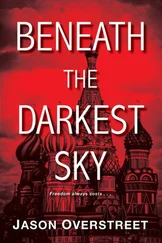“Because of everything.” She turned toward him, smiling. “But I don’t really mean it. This is just the right hour to go out. Let’s.”
Aïn Krorfa was beginning to awaken from its daily sun-drugged stupor. Behind the fort, which stood near the mosque on a high rocky hill that rose in the very middle of the town, the streets became informal, there were vestiges of the original haphazard design of the native quarter. In the stalls, whose angry lamps had already begun to gutter and flare, in the open cafés where the hashish smoke hung in the air, even in the dust of the hidden palm-bordered lanes, men squatted, fanning little fires, bringing their tin vessels of water to a boil, making their tea, drinking it.
“Teatime! They’re really Englishmen dressed for a masquerade,” said Kit. She and Port walked very slowly, hand in hand, perfectly in tune with the soft twilight. It was an evening that suggested languor rather than mystery.
They came to the river, here merely a flat expanse of white sand stretching away in the half light, and followed it a while until the sounds of the town became faint and high in the distance. Out here the dogs barked behind the walls, but the walls themselves were far from the river. Ahead of them a fire burned; seated by it was a solitary man playing a flute, and beyond him in the shifting shadows cast by the flames, a dozen or so camels rested, chewing solemnly on their cuds. The man looked toward them as they passed, but continued his music.
“Do you think you can be happy here?” asked Port in a hushed voice.
Kit was startled. “Happy? Happy? How do you mean?”
“Do you think you’ll like it?”
“Oh, I don’t know!” she said, with an edge of annoyance in her voice. “How can I tell? It’s impossible to get into their lives, and know what they’re really thinking.”
“I didn’t ask you that,” Port remarked, nettled.
“You should have. That’s what’s important here.”
“Not at all,” he said. “Not for me. I feel that this town, this river, this sky, all belong to me as much as to them.”
She felt like saying: “Well, you’re crazy,” but she confined herself to: “How strange.”
They circled back toward the town, taking a road that led between garden walls.
“I wish you wouldn’t ask me such questions,” she said suddenly. “I can’t answer them. How could I say: yes, I’m going to be happy in Africa? I like Aïn Krorfa very much, but I can’t tell whether I want to stay a month or leave tomorrow.”
“You couldn’t leave tomorrow, for that matter, even if you did want to, unless you went back to Boussif. I found out about the buses. It’s four days before the one for Bou Noura leaves. And it’s forbidden to get rides on trucks to Messad now. They have soldiers who check along the way. There’s a heavy fine for the drivers.”
“So we’re stuck in the Grand Hotel.”
“With Tunner,” thought Port. Aloud: “With the Lyles.”
“God forbid,” Kit murmured.
“I wonder how long we’ve got to keep on running into them. I wish to hell they’d either get ahead of us once and for all, or let us get ahead of them and stay there.”
“Things like that have to be arranged,” said Kit. She, too, was thinking of Tunner. It seemed to her that if presently she were not going to have to sit opposite him over a meal, she could relax completely now, and live in the moment, which was Port’s moment. But it seemed useless even to try, if in an hour she was going to be faced with the living proof of her guilt.
It was completely dark when they got back to the hotel. They ate fairly late, and after dinner, since no one felt like going out, they went to bed. This process took longer than usual because there was only one wash basin and water pitcher—on the roof at the end of the corridor. The town was very quiet. Some café radio was playing a transcription of a record by Abd-el-Wahab: a dirge-like popular song called: I Am Weeping Upon Your Grave . Port listened to the melancholy notes as he washed; they were broken into by nearby outbursts of dogs barking.
He was already in bed when Eric tapped on his door. Unfortunately he had not turned off his light, and for fear that it showed under the door he did not dare pretend to be asleep. The fact that Eric tiptoed into the room, a conspiratorial look on his face, displeased him. He pulled his bathrobe on.
“What’s the matter?” he demanded. “Nobody’s asleep.”
“I hope I’m not disturbing you, old man.” As always, he appeared to be talking to the corners of the room.
“No, no. But it’s lucky you came when you did. Another minute and my light would have been out.”
“Is your wife asleep?”
“I believe she’s reading. She usually does before she goes to sleep. Why?”
“I wondered if I might have that novel she promised me this afternoon.”
“When, now?” He passed Eric a cigarette and lit one himself.
“Oh, not if it will disturb her.”
“Tomorrow would be better, don’t you think?” said Port, looking at him.
“Right you are. What I actually came about was that money—” He hesitated.
“Which?”
“The three hundred francs you lent me. I want to give them back to you.”
“Oh, that’s quite all right.” Port laughed, still looking at him. Neither one spoke for a moment.
“Well, of course, if you like,” Port said finally, wondering if by any unlikely chance he had misjudged the youth and somehow feeling more convinced than ever that he had not.
“Ah, excellent,” murmured Eric, fumbling about in his coat pocket. “I don’t like to have these things on my conscience.”
“You didn’t need to have it on your conscience, because if you’ll remember, I gave it to you. But if you’d rather return it, as I say, naturally, that’s fine with me.”
Eric had finally extracted a worn thousand-franc note, and held it forth with a faint, propitiatory smile. “I hope you have change for this,” he said, finally looking into Port’s face, but as though it were costing him a great effort. Port sensed that this was the important moment, but he had no idea why. “I don’t know,” he said, not taking the proffered bill. “Do you want me to look?”
“If you could.” His voice was very low. As Port clumsily got out of bed and went to the valise where he kept his money and documents, Eric seemed to take courage.
“I do feel like a rotter, coming here in the middle of the night and bothering you this way, but first of all I want to get this off my mind, and besides, I need the change badly, and they don’t seem to have any here in the hotel, and Mother and I are leaving first thing in the morning for Messad and I was afraid I might not see you again—”
“You are? Messad?” Port turned, his wallet in his hand. “Really? Good Lord! And our friend Mr. Tunner wants so much to go!”
“Oh?” Eric stood up slowly. “Oh?” he said again. “I daresay we could take him along.” He looked at Port’s face and saw it brighten. “But we’re leaving at daybreak. You’d better go immediately and tell him to be ready downstairs at six-thirty. We’ve ordered tea for six o’clock. You’d better have him do likewise.”
“I’ll do that,” said Port, slipping his wallet into his pocket. “I’ll also ask him for the change, which I don’t seem to have.”
“Good. Good,” Eric said with a smile, sitting down again on the bed.
Port found Tunner naked, wandering distractedly around his room with a DDT bomb in his hand. “Come in,” he said. “This stuff is no good.”
“What have you got?”
“Bedbugs, for one thing.”
“Listen. Do you want to go to Messad tomorrow morning at six-thirty?”
Читать дальше











